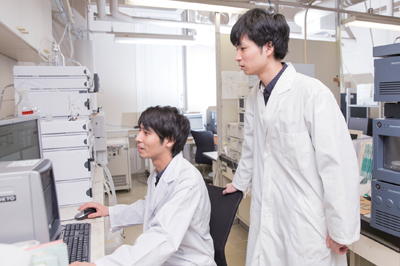About the Graduate School of Integrated Pharmaceutical and Nutritional Sciences

The Graduate School of Integrated Pharmaceutical and Nutritional Sciences is a collaborative research and education program integrating the Graduate Division of Pharmaceutical Sciences and the Graduate Division of Nutritional and Environmental Sciences. The School was established in 2012 to continue research in the cutting-edge area of “integrated food-pharmaceutical science”, which endeavors to discover and promote scientific knowledge of the relationship between foods, pharmaceutical products, and the maintenance of human health. This research program, the first of its kind in Japan, began with our 21st Century Center of Excellence (COE) Program (2002-2007) and continued with our Global COE Program (2007-2012). Both programs were funded with competitive grants from Japan’s Ministry of Education, Culture, Sports, Science and Technology (MEXT). Since the establishment of the School, the University of Shizuoka has placed first in several rankings of Japanese universities, including in the “Agriculture” category of the Thompson-Reuters University Rankings for Japan in 2013 and 2014, as well as in the “Eating habits (Dietary sciences)”, “Environmental and hygienic pharmacy” and “Integrated nutrition science” categories in Japan’s National Grants-in-Aid for Scientific Research Funding Program in 2017.
The School offers graduate programs in the following five areas: Pharmacy, Pharmaceutical Sciences, Pharmaceutical and Nutritional Sciences, Food and Nutritional Sciences, and Environmental Health Sciences. The Graduate Program in Pharmacy (for pharmacists) and the Graduate Program in Pharmaceutical Sciences (for drug researchers) provide education in the pharmaceutical fields, which are offered by faculty members in the Graduate Division of Pharmaceutical Sciences. The Graduate Program in Food and Nutritional Sciences and the Graduate Program in Environmental Health Sciences are closely related and complementary programs which are offered by faculty members in the Graduate Division of Nutritional and Environmental Sciences.
The School provides graduate students with a unique curriculum, including advanced courses and integrated seminars on health longevity science. In addition to students who study pharmaceutical, food and nutritional, or environmental sciences, the School accepts a wide variety of talented individuals as doctoral candidates, including graduate students who have studied other scientific fields, company-based researchers in full-time employment, and highly motivated foreign students preparing for professional careers in Japan or other countries.
Graduate Program in Pharmacy
The Graduate Program in Pharmacy aims to foster highly-skilled specialists who will work at the cutting edge of medical and clinical pharmacy and related fields through the development of advanced clinical and research skills. Two courses are offered by the Program. The Medical Pharmacy Course trains researchers and educators in medical pharmacy and related fields. The Clinical Pharmacy Course offers training to pharmacists for supervisory roles, as well as to other professionals involved in clinical trials and clinical development. The Program also provides support to individuals seeking qualifications as pharmacists specializing in cancer and infectious diseases, and as coordinators of clinical trials. We have established Japan’s first Pharmaceutical Education and Research Center at Shizuoka General Hospital, where postgraduate students are supervised in practical training and research. Graduates of the program are sought after to play key roles as research and development specialists at pharmaceutical companies, as hospital pharmacists, and as researchers in the fields of medical and clinical pharmacy.
Graduate Program in Pharmaceutical Sciences
The Graduate Program in Pharmaceutical Sciences aims to foster scientists and other researchers with advanced knowledge and innovative research skills related to drug discovery and development. In the Master’s and Doctoral courses, students acquire comprehensive knowledge of both fundamental and cutting-edge pharmaceutical science, as well as advanced research skills. The Center for Drug Discovery is affiliated with the Program, engaging in research to discover and develop drugs in collaboration with other universities, public research organizations, and corporations. The Program seeks highly motivated students with an interest in elucidating the mechanisms of health and illness at the molecular level, discovering drugs, and contributing to the enhancement of human health. Students are expected to be ambitious in pursuing their goals and to have the potential to play a significant role in the international professional community. Graduates of the program are sought after as scientists and other researchers in the discovery and development of drugs, as administrators in positions requiring advanced expertise, and as academic staff involved in education and research in pharmaceutical sciences.
Graduate Program in Pharmaceutical and Nutritional Sciences
The Graduate Program in Pharmaceutical and Nutritional Sciences was launched with the establishment of the Graduate School of Integrated Pharmaceutical and Nutritional Sciences. The main objective of the program is to further build on the research into the “fusion of food and drugs” which we developed in our Global COE Program. In this program, the pharmaceutical sciences, which aim to elucidate the causes of various diseases and to discover and develop safe remedies for them, is fused with the food and nutritional sciences, which aim to develop and evaluate the safety of high efficacy functional foods, and to help prevent illness by elucidating the pharmacokinetics of food constituents in the body.
Students who have completed a Master’s degree in either Pharmaceutical Sciences or Food and Nutritional Sciences are trained to have comprehensive knowledge of the other field. They are trained as scientists and other specialists to undertake cutting-edge research in the life sciences spanning the boundary between drugs and diet. Graduates of the program will have the problem-solving abilities required to tackle issues related to the interactive and synergetic effects of pharmaceuticals and food. They are expected to play significant roles as scientists and other researchers in a wide range of fields related to the research and development of products fusing drugs and food, as administrators in positions requiring high levels of expertise, or as academic staff involved in research and education in fields related to pharmaceutical sciences, food sciences, and/or nutritional sciences.
Students who have completed a Master’s degree in either Pharmaceutical Sciences or Food and Nutritional Sciences are trained to have comprehensive knowledge of the other field. They are trained as scientists and other specialists to undertake cutting-edge research in the life sciences spanning the boundary between drugs and diet. Graduates of the program will have the problem-solving abilities required to tackle issues related to the interactive and synergetic effects of pharmaceuticals and food. They are expected to play significant roles as scientists and other researchers in a wide range of fields related to the research and development of products fusing drugs and food, as administrators in positions requiring high levels of expertise, or as academic staff involved in research and education in fields related to pharmaceutical sciences, food sciences, and/or nutritional sciences.
Graduate Program in Food and Nutritional Sciences
The Graduate Program in Food and Nutritional Sciences consists of two divisions, the Division of Food Life Sciences and the Division of Nutritional Life Sciences, which work together in a spirit of strong mutual cooperation. The Division of Food Life Science emphasizes education and research on the chemical composition of food, processing and storage technology, food safety, food functionality, chemical biology, genetic engineering, and information science. The Division of Nutritional Life Sciences focuses on basic, applied, and practical research on the biological response of nutrients, molecular mechanisms of functional ingredients, nutrition and dietary management in the treatment of diseases, and prevention of lifestyle-related diseases, and trains highly specialized professionals and researchers who are active in their fields.
Graduate Program in Environmental Health Sciences
The Graduate Program in Environmental Health Sciences is composed of two courses; the Global, Regional, and Local Environments Course and the Environmental Life Sciences Course. The former course carries out research in the environmental sciences, studying chemical pollutants from the points of view of their origin, fate, environmental impacts, and human risks. The latter course carries out research on the effects of environmental factors on ecosystems, human health, and biological functions at the levels of organs, cells, and genes. Applied microbiology for a sustainable environment and food production is also performed.
The program welcomes individuals pursuing an advanced degree with diverse backgrounds, experiences, and nationalities.
The program welcomes individuals pursuing an advanced degree with diverse backgrounds, experiences, and nationalities.


